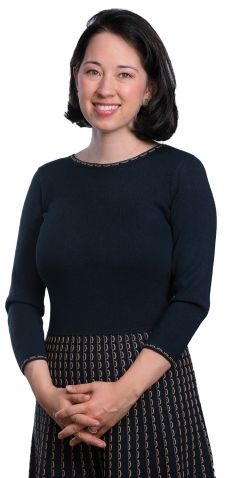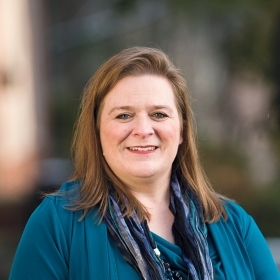Photo by Lisa Abitbol
Jennifer Chudy, Knafel Assistant Professor of Social Sciences and assistant professor of political science, studies American politics with an emphasis on race and ethnicity—phenomena currently at the very heart of political debate in the United States. Within this broad field, she focuses on the attitude of racial sympathy, defined as white distress over Black suffering.
“I myself am a product of a mixed-race marriage, not Black-white, but Asian-white,” Chudy says. “Growing up, I always had a curiosity about how groups see each other, because that was what was familiar to me. In my own household, I saw unfold how people from two different backgrounds thought about the world.”
Growing up, Chudy became interested in politics. She went to graduate school intent on studying race and American politics, earning her bachelor’s at Brown and her Ph.D. at the University of Michigan, both in political science. “I was told, you have to start with understanding the relationship between Black Americans and white Americans, because it’s the centerpiece of American politics,” she says.
Chudy says the election of Barack Obama and the number of white people who supported him, “not just because he was a Democrat and an attractive candidate but because he was Black,” and then the events of last summer, with many white people protesting the murder of George Floyd, have helped people better understand her field of study. “The real world keeps showing me that [white racial sympathy] is an important political phenomenon,” she says. “I find that sympathy motivates support for policies perceived to benefit, as well as opposition to policies perceived to harm, African Americans.”
As these events have unfolded, white sympathy has led people to want to do something. “The approach of a lot of folks has been, ‘Oh, we just need to learn more.’ They intellectualize it,” says Chudy. “But my research says that’s not the missing piece. I’m actually looking for an emotional response. If a white person has no idea about the history of this country, but learns that African Americans are disproportionately affected by the coronavirus, I argue that’s more politically powerful than a white person who knows all the facts but has no reaction. My research suggests there has to be an emotional attachment to what’s going on, rather than just the cataloguing of facts.”
And study is not enough. “As a political scientist, I worry that if that doesn’t eventually trickle up into something that touches policy or politics, it’ll just perpetuate,” Chudy says. “Protest is a form that a lot of folks use—and there is evidence that in some cases, politicians are attentive to protesters.” Action could mean signing a petition that gets sent to an elected official, or writing a letter or calling an elected official. “At the most advanced level, it could be joining an organization that’s pushing for policy changes and crafting policies that are being discussed with elected officials,” she says.
Race remains the most critical fault line in American politics, Chudy says, and she sees greater recognition of that, especially after the election of Obama followed by Donald Trump. “A lot of students of color—who are growing in numbers at Wellesley, which makes the classroom conversation different—would be immediately in agreement,” she says. “There’s more awareness of the importance that race and racial attitudes play, not only in folks’ everyday lives, which students may have experienced themselves, but in how it maps onto politics.”
Chudy joined the Wellesley faculty in 2017. This fall, she will be teaching an introduction to American politics. “I think most people would rightly assume we go through things like, what does the Supreme Court do? How does the electoral college work? But teach it in an innovative way.” Normally, an intro course starts with America’s foundational documents and goes from there.
Not this one. “I’m a huge fan of musicals, and I love Merrily We Roll Along by Stephen Sondheim, which goes from the present and advances backward. I watched this musical, and I thought, ‘I bet I could make intro to American politics more interesting if I met students at the present day, in September, when interest is high.’ So we talk about the most recent elections, and then ask, what were the forces that shaped that outcome? And every week we go back and back and back, and then the last class is the Declaration of Independence. By the time they read those documents at the end, they’re thinking about politics in a different way,” she says.







We ask that those who engage in Wellesley magazine's online community act with honesty, integrity, and respect. (Remember the honor code, alums?) We reserve the right to remove comments by impersonators or comments that are not civil and relevant to the subject at hand. By posting here, you are permitting Wellesley magazine to edit and republish your comment in all media. Please remember that all posts are public.